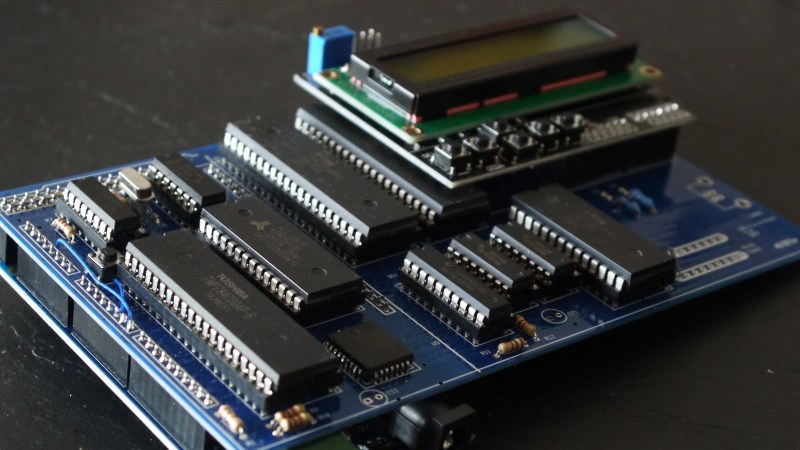There have been plenty of Z80 computer builds here on Hackaday, but what sets them apart is what you do with them. [Andrew] writes in with his Z80 single-board computer made from scratch, using the Arduino standard headers for its I/O. In turn, since he needed an easy way to program the flash memory which holds the software to run on the Z80, he used an Arduino Mega as a debugger, making the SBC an Arduino shield itself.
Using such a common header pinout for the Z80 computer allows it to be used with a variety of readily-available Arduino shields. This compatibility is achieved with an analog-digital converter and a 3.3 V regulator, mimicking the pins found in an Arduino Uno. The code, available on GitHub, includes an extensive explanation and walkthrough over the process in which the Mega takes over the bus from the Z80 to function as a fully-featured debugger. Programs can be loaded through embedding an assembly listing into the Mega’s sketch, or, once the debugger is up you can also upload a compiled hex file through the serial connection.
This isn’t the first time [Andrew] has been featured here, and his past projects are just as interesting. If you need to translate a Soviet-era calculator’s buttons into English, hack a metallurgical microscope or even investigate what’s that Clacking Clanking Scraping Sound, he’s the one you should call.
















Interesting combination. I wonder why no one has fused a Raspberri Pi with a an Arduino Mega.
This fusion came about from the need of a boot loading process and debugging support. i.e. buring the flash ram.
Both Raspberri and Arduino environments are self supporting. So, the motivation to mix the 2 becomes “because.”
Actually, there are valid reasons to mate a Pi and Arduino. One being that the Arduino can process raw I/O faster than the Pi. There is a beer dispensing meter project that uses flow meters whose outputs are too fast for the Pi to count, so they use the Pi for web UI and beer tracking and the Arduino to measure flow. It uses an off-the-shelf hat with an embedded Arduino and RTC (Gertduino?).
For those who are interested:
GertDuino info: https://www.raspberrypi-spy.co.uk/2013/11/introducing-the-gertduino-add-on-board-for-raspberry-pi/
Raspberry Pints: http://raspberrypints.com/
I like the debugger. If you’re interested in software for the z80 side you cloud look at the olduino/z
https://olduino.wordpress.com/about-2/about-olduinoz/
I would like to learn more about your design. I tried to access the files on Github, but It seems the schematics docs are from eGDA which runs on Linux. My PC is WIndows system so I can not run eGDA. Would you upload a .pdf of the schematic?
Thanks!
I have uploaded a PDF version of the schematics and some more information about the modification needed to the V2.0 PCB (the one on dirty PCBs)